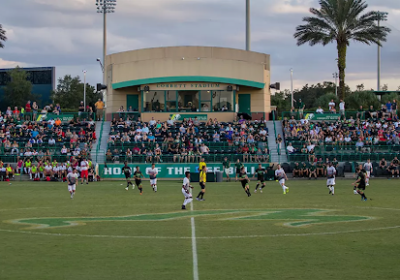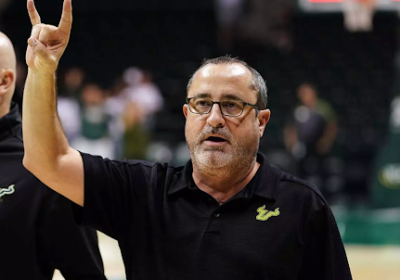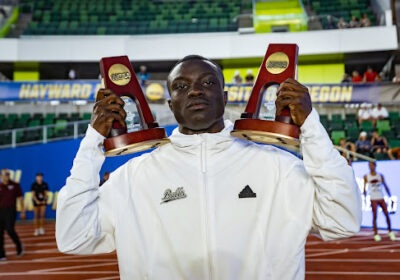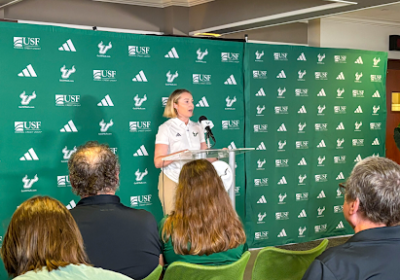A coach’s perspective: How NCAA rule changes affect USF baseball

With a brand new NCAA DI baseball season coming to fruition, new rules and limitations have been put in place that bring changes to the game.
On opening day, all teams will be implementing these new rules – including USF baseball.
Here is what to expect when watching baseball in 2023:
 Speeding the pace of game and pitch clocks has been a controversial discussion at all levels of baseball in recent years. They will start creeping their way into USF baseball starting Friday.
Speeding the pace of game and pitch clocks has been a controversial discussion at all levels of baseball in recent years. They will start creeping their way into USF baseball starting Friday.
One way the NCAA is combating the length of matchups is with a strict two-minute timer between innings. With that comes a 20-second pitch clock also used to hasten the pace of play.
In the 20 seconds that are recorded, a pitcher must begin his delivery, or else a ball will be recorded in the count. The same consequence goes to the batter, with a strike placed in the count if he fails to step in the box in time.
Coach Billy Mohl said he knows that accommodating these changes will be challenging not only for his team, but across all of the NCAA.
“Major League Baseball is making a big push forward just for the length of the games, and do I like it? I’m more of a traditionalist,” Mohl said.
“Baseball was always known as a game without a clock, and now we’re putting one in so it’s gonna be an adjustment process for everybody across the country in terms of the timing, and how quick it’s gonna speed up. A lot of different nuances that go along with it, so we’ll see how it goes. Everybody’s going to be kind of testing it out this year.”
 A rule that specifically targets pitchers is the allowance of one step-off or fake throw for each batter faced, but it can be used up in other places on the field as well.
A rule that specifically targets pitchers is the allowance of one step-off or fake throw for each batter faced, but it can be used up in other places on the field as well.
If a defensive player calls a time-out during an at-bat, the pitcher can no longer conduct a step-off or throw in that period. However, this doesn’t affect the amount of times pitchers can use a pickoff move.
For coaches that use this move as a vital part of their game plan, their teams may now have to find a different approach. This is something Mohl said he thought about before heading into his 2023 campaign, but he said there is relief in the change as well.
“There’s strategy involved in it. You step off and now you know that the guy’s got to either pitch to you or throw a pickoff move. If he doesn’t within the 20 seconds it’s an automatic ball to the hitter,” Mohl said.
“There’s definitely going to be some strategy involved in it, but like I said, that’s something we’re going to see as we go. I know I got tired of watching all the fake pickoffs.”
 Beginning this year, umpires will now be able to initiate their own video reviews if needed based on the situation.
Beginning this year, umpires will now be able to initiate their own video reviews if needed based on the situation.
Specifically, if the umpire initiates this process, it would likely source from a catcher’s interference and hostile contact or misconduct.
This new rule is the least of Mohl’s worries, as he said all it does is ensure the accuracy of calls.
“The whole umpires association wants to get the call right. The more chances we have, I mean, it’s going to cut down on arguing. You got video evidence to confirm things now, so a lot less animosity between umpires and coaches. I have no issues with that,” Mohl said.
 Last season, dozens of programs showcased their team traditions by showing off iconic celebrations.
Last season, dozens of programs showcased their team traditions by showing off iconic celebrations.
From Virginia Tech’s sledgehammer to Tennessee’s ‘Homer Daddy’ hat, these shenanigans will now be directed into the dugout instead of home plate where teammates usually gather and celebrate.
One of the best home run celebrations in baseball. Congrats to Tanner Schobel on his first homer with Virginia Tech. @HokiesBaseball pic.twitter.com/wRmAb2LICF
— Jared Carrabis (@Jared_Carrabis) March 6, 2021
I don’t think I’m ever gonna not laugh at the home run celebration hat Tennessee baseball uses. pic.twitter.com/0d4CLl2qsV
— Wes Rucker (@wesrucker247) March 13, 2021
Tennessee Baseball home run celebration now consists of a fur coat and pink ‘daddy’ hat.
Glorious @Vol_Baseball pic.twitter.com/XedvhLkodF
— Trey Wallace (@TreyWallace_) February 18, 2022
Right before Super Regionals in 2022, the NCAA banned props on the field for the tournament and the remainder of the postseason. The embargo will continue this season.
Mohl said he isn’t against these efforts, seeing that the fun will still go on in the dugouts but will also provide respect to others on the playing field.
“The rule now states that you can have the prop, it just can’t enter the field of play. You can have it in the dugout, but some people were taking it to extremes. There are teams with sledgehammers, poking holes into grounds and everything else,” Mohl said.
“They didn’t completely get rid of it, but I think they did need to control it a little bit because I saw basketball hoops being brought out and slam dunked on. It’s fun for the fans, but when you’re the guy on the mound who just gave up that dinger…College baseball is supposed to be fun. I’m glad they didn’t get rid of it completely, but I’m glad there are at least some parameters in there.”
 Although it isn’t mandatory, the NCAA is now allowing coaches and/or conferences to agree upon whether or not they would allow a runner on second in extra innings.
Although it isn’t mandatory, the NCAA is now allowing coaches and/or conferences to agree upon whether or not they would allow a runner on second in extra innings.
However, it most likely won’t be seen for a long time in South Florida, according to Mohl.
“That’s league by league, so we’re not doing it. We’re playing straight up. I hated that during COVID-19. That was terrible. It was terrible,” Mohl said.








